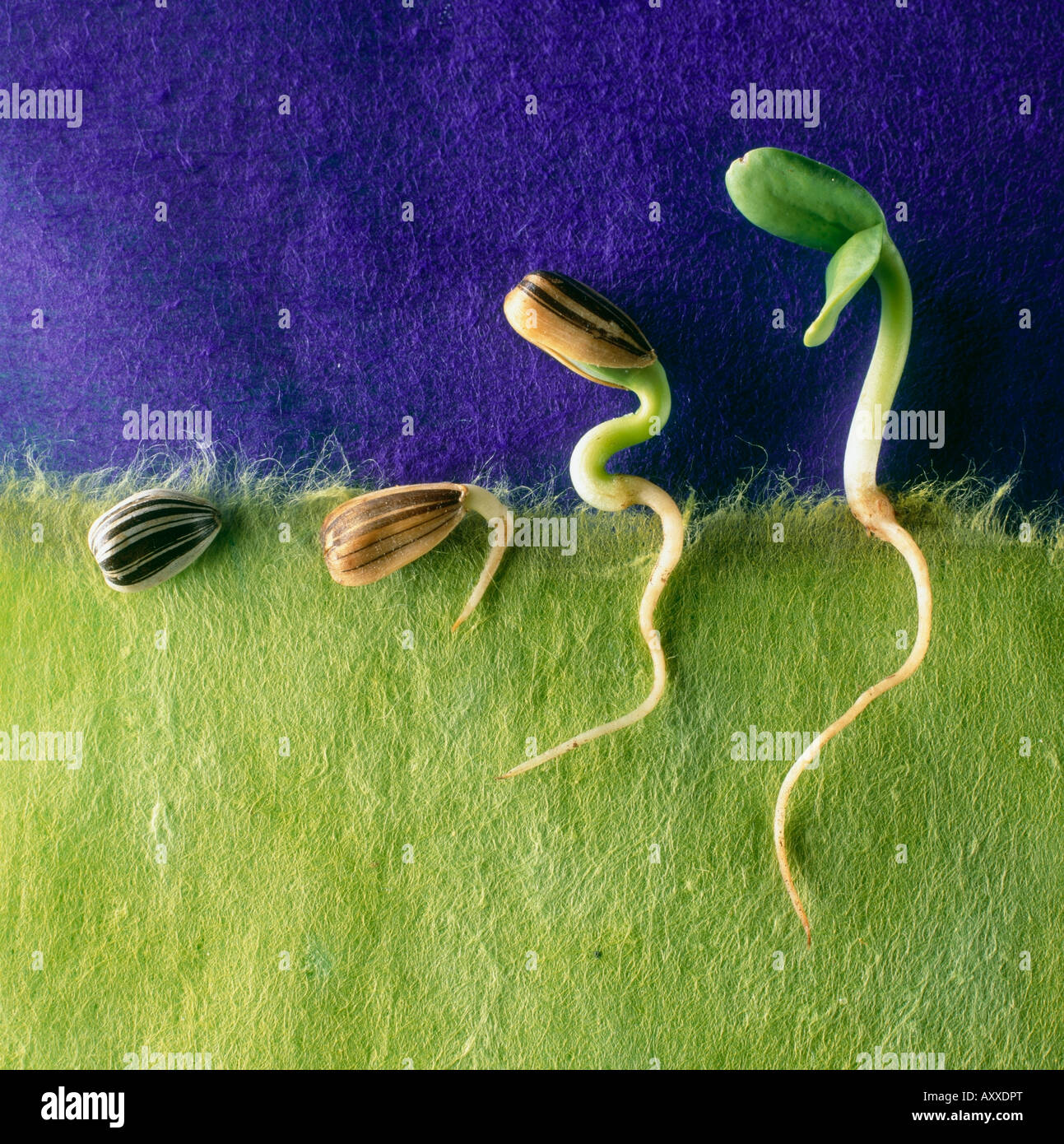Understanding the Sunflower Seed Sprouting Process
Sunflower seed germination is a complex process that involves the interplay of various factors, including water, temperature, and light. To successfully sprout sunflower seeds, it’s essential to understand the basics of this process and provide optimal conditions for germination. When sunflower seeds are exposed to water, the embryo inside the seed begins to break down, and the seed coat starts to soften. This process, known as imbibition, allows the seed to absorb water and swell, eventually leading to the emergence of the radicle (primary root) and the cotyledon (seed leaf).
Proper seed preparation is critical for successful germination. Sunflower seeds should be stored in a cool, dry place to maintain their viability. Before sowing, seeds should be inspected for any signs of damage or deterioration. It’s also essential to use high-quality seeds that are specifically bred for germination and growth.
Soil conditions also play a crucial role in sunflower seed germination. The ideal soil temperature for germination is between 65°F and 75°F (18°C and 24°C). Soil moisture levels should be maintained at around 60% to 80% of the soil’s water-holding capacity. Additionally, the soil should be well-draining and have a pH between 6.0 and 7.0.
While the exact time it takes for sunflower seeds to sprout can vary depending on several factors, understanding the basics of the germination process can help you provide optimal conditions for successful growth. By following proper seed preparation and soil conditions, you can increase the chances of successful germination and give your sunflower seeds the best start.
Factors Affecting Sunflower Seed Sprouting Time
Soil temperature, moisture levels, and seed quality are just a few of the factors that can influence the time it takes for sunflower seeds to sprout. Understanding these factors can help you optimize conditions for faster germination and improve the chances of successful growth. For example, sunflower seeds typically germinate best in soil temperatures between 65°F and 75°F (18°C and 24°C). If the soil is too cold, germination may be delayed or inhibited.
Soil moisture levels also play a crucial role in sunflower seed germination. The ideal moisture level is around 60% to 80% of the soil’s water-holding capacity. If the soil is too dry, seeds may not germinate, while excessive moisture can lead to rot and poor germination. Seed quality is another essential factor, as high-quality seeds are more likely to germinate quickly and uniformly.
Light is also an important factor in sunflower seed germination. While sunflower seeds can germinate in low light conditions, they typically require at least 12 hours of indirect light per day to germinate successfully. In addition, the depth at which seeds are sown can also impact germination time. Sowing seeds too deeply can delay germination, while sowing them too shallowly can lead to poor germination or seedling death.
By understanding and optimizing these factors, you can create an environment that fosters rapid and successful germination, helping you answer the question of how long does it take sunflower seeds to sprout and giving your sunflower seeds the best start.
The Ideal Conditions for Sunflower Seed Germination
Creating an optimal environment for sunflower seed germination is crucial for successful growth. The ideal temperature for sunflower seed germination is between 65°F and 75°F (18°C and 24°C). Soil temperatures above 80°F (27°C) can inhibit germination, while temperatures below 55°F (13°C) can slow down the process.
Light is also an essential factor in sunflower seed germination. Sunflower seeds can germinate in low light conditions, but they typically require at least 12 hours of indirect light per day to germinate successfully. In addition, the light intensity should be moderate, as high light intensities can inhibit germination.
Water is another critical factor in sunflower seed germination. The ideal moisture level is around 60% to 80% of the soil’s water-holding capacity. If the soil is too dry, seeds may not germinate, while excessive moisture can lead to rot and poor germination.
To create a suitable environment for sprouting, you can use greenhouses or indoor growing setups. These environments allow for precise control over temperature, light, and water conditions, making it easier to optimize conditions for sunflower seed germination. Additionally, you can use grow lights to provide the necessary light intensity and spectrum for sunflower seed germination.
By creating an optimal environment for sunflower seed germination, you can increase the chances of successful growth and answer the question of how long does it take sunflower seeds to sprout. With the right conditions, sunflower seeds can germinate quickly and uniformly, giving you a head start on growing healthy and robust sunflowers.
How to Sow Sunflower Seeds for Faster Germination
Sowing sunflower seeds correctly is crucial for successful germination. To start, choose a location with full sun and well-draining soil. Sunflower seeds prefer a slightly acidic to neutral soil pH, ranging from 6.0 to 7.0.
Before sowing, prepare the soil by loosening it to a depth of 12-18 inches. Remove any debris, rocks, or weeds that could interfere with seed germination. If your soil is heavy clay or sandy, mix in some organic matter like compost or well-rotted manure to improve its structure.
Sow sunflower seeds 1 inch deep and 6 inches apart in rows that are 3 feet apart. You can also sow seeds in clusters, with 3-4 seeds per cluster, and thin them out to the strongest seedling later. Water the soil gently but thoroughly after sowing.
It’s essential to sow sunflower seeds at the correct depth. Sowing seeds too deeply can lead to poor germination or seedling death, while sowing them too shallowly can cause them to dry out. By sowing seeds at the correct depth, you can ensure optimal germination and give your sunflower seeds the best start.
Proper sowing techniques can also help you answer the question of how long does it take sunflower seeds to sprout. By providing optimal conditions for germination, you can reduce the time it takes for sunflower seeds to sprout and increase the chances of successful growth.
Common Mistakes to Avoid When Sowing Sunflower Seeds
When sowing sunflower seeds, it’s essential to avoid common mistakes that can hinder germination. One of the most common mistakes is overwatering, which can lead to rot and poor germination. On the other hand, underwatering can also cause seeds to dry out and fail to germinate.
Another common mistake is sowing seeds too deeply. Sunflower seeds should be sown about 1 inch deep, as sowing them too deeply can lead to poor germination or seedling death. Sowing seeds too shallowly can also cause them to dry out and fail to germinate.
Soil preparation is also crucial for successful germination. Failing to loosen the soil to the correct depth or not removing debris and rocks can hinder seed germination. Additionally, not providing enough space between seeds can lead to overcrowding, which can reduce germination rates.
To troubleshoot and correct these issues, it’s essential to monitor soil moisture levels and adjust watering accordingly. Also, ensure that the soil is loose and well-draining, and remove any debris or rocks that may be hindering germination.
By avoiding these common mistakes, you can increase the chances of successful germination and answer the question of how long does it take sunflower seeds to sprout. With proper sowing techniques and optimal growing conditions, sunflower seeds can germinate quickly and uniformly, giving you a head start on growing healthy and robust sunflowers.
How Long Does it Take for Sunflower Seeds to Sprout?
The time it takes for sunflower seeds to sprout can vary depending on several factors, including soil temperature, moisture levels, and seed quality. Under optimal conditions, sunflower seeds can germinate in as little as 6-8 days. However, germination times can range from 7-14 days, with some seeds taking up to 21 days to sprout.
The average time it takes for sunflower seeds to sprout is around 10-12 days. This is because sunflower seeds typically require a period of cold stratification to break dormancy, followed by a period of warm temperatures to stimulate germination.
Factors such as soil temperature, moisture levels, and seed quality can influence germination times. For example, sunflower seeds sown in warm, moist soil can germinate faster than those sown in cool, dry soil. Similarly, high-quality seeds can germinate faster and more uniformly than lower-quality seeds.
Understanding the factors that influence germination times can help you answer the question of how long does it take sunflower seeds to sprout. By providing optimal growing conditions and using high-quality seeds, you can increase the chances of successful germination and reduce the time it takes for sunflower seeds to sprout.
It’s also important to note that germination times can vary depending on the specific variety of sunflower. Some varieties, such as ‘Mammoth’ or ‘Velvet Queen’, may take longer to germinate than others, such as ‘Red Sun’ or ‘Soraya’. By choosing a variety that is known for its fast germination rate, you can get a head start on growing healthy and robust sunflowers.
Monitoring and Caring for Sunflower Seedlings
After germination, it’s essential to provide sunflower seedlings with the right care to ensure they grow into healthy and robust plants. One of the most critical factors is watering. Sunflower seedlings need consistent moisture, especially during the first few weeks after germination.
Watering should be done gently but thoroughly, making sure the soil is moist but not waterlogged. Overwatering can lead to root rot and other problems, while underwatering can cause seedlings to become stressed and vulnerable to disease.
Fertilizing is also crucial for sunflower seedlings. A balanced fertilizer with a ratio of 10-10-10 (nitrogen-phosphorus-potassium) can provide the necessary nutrients for healthy growth. However, it’s essential to follow the instructions on the fertilizer package and avoid overfertilizing, which can damage the seedlings.
Providing support is also important for sunflower seedlings. As they grow, they may need staking to prevent them from toppling over in the wind. Use soft ties or twine to tie the seedlings to the stake, making sure not to damage the stem.
Monitoring seedling health is also crucial. Keep an eye out for signs of disease, pests, or nutrient deficiencies, and take action promptly if you notice any problems. Regularly inspect the seedlings for signs of stress, such as yellowing leaves or droopy stems, and adjust their care accordingly.
By providing the right care and attention, you can help your sunflower seedlings grow into healthy and robust plants. This, in turn, can help you answer the question of how long does it take sunflower seeds to sprout and give you a head start on growing beautiful and vibrant sunflowers.
Conclusion: Giving Your Sunflower Seeds the Best Start
Unlocking the secrets of sunflower seed germination requires a combination of proper seed preparation, optimal growing conditions, and careful monitoring. By understanding the role of water, temperature, and light in the germination process, you can create a suitable environment for sprouting and give your sunflower seeds the best start.
Remember to optimize soil temperature, moisture levels, and seed quality to ensure faster germination. Avoid common mistakes such as overwatering, underwatering, or sowing seeds too deeply, and troubleshoot any issues that may arise.
By following the tips and guidelines outlined in this article, you can increase the chances of successful germination and answer the question of how long does it take sunflower seeds to sprout. With proper care and attention, your sunflower seedlings can grow into healthy and robust plants, providing you with a bountiful harvest of beautiful and vibrant sunflowers.
In conclusion, giving your sunflower seeds the best start requires attention to detail, patience, and a willingness to learn. By mastering the art of sunflower seed germination, you can unlock the full potential of these magnificent plants and enjoy the many benefits they have to offer.







